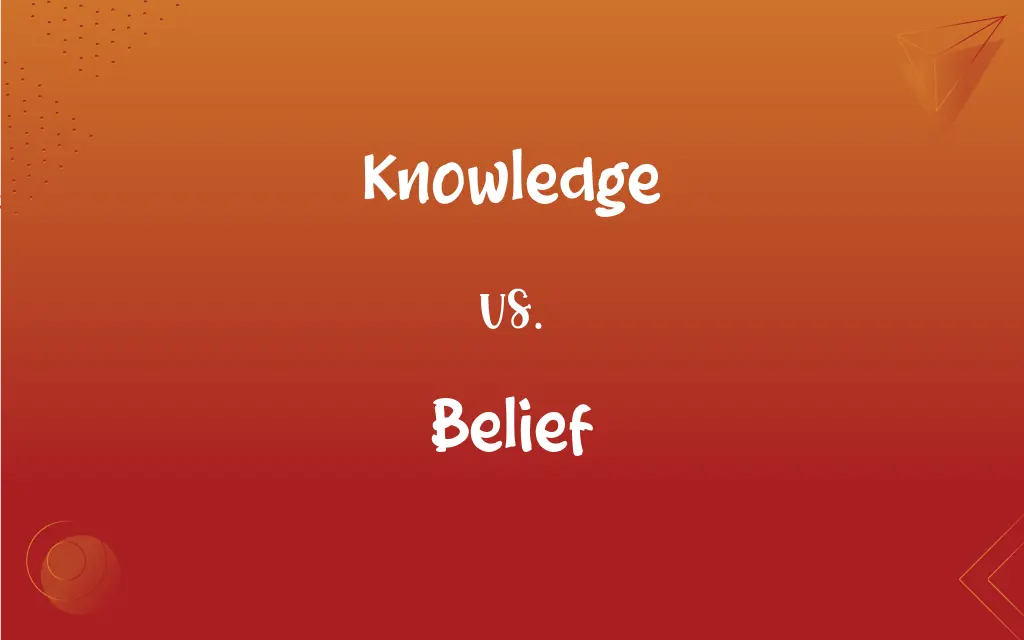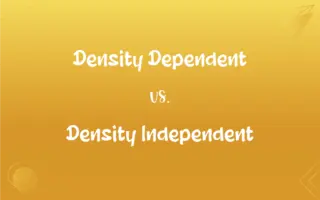Knowledge vs. Belief: What's the Difference?
Edited by Aimie Carlson || By Harlon Moss || Published on January 12, 2024
Knowledge is factual information or understanding derived from evidence or experience, while belief is an acceptance that something exists or is true, often without proof.

Key Differences
Knowledge is based on evidence, facts, or experiences that can be verified, whereas belief is often based on personal conviction, faith, or opinion without the need for empirical evidence.
Knowledge typically involves understanding and awareness of specific information or principles, often acquired through education or experience. Belief, in contrast, is more about individual perception or faith in a concept, idea, or assertion.
The certainty associated with knowledge is usually stronger, as it is often supported by proof or consensus. Belief can exist without proof and is more subjective, relying on personal or cultural perspectives.
Knowledge can be shared and verified across individuals, making it more objective. Belief is inherently personal and can vary significantly from one person to another.
The formation of knowledge often involves critical thinking and reasoning, while beliefs can be formed and maintained even in the absence of logical or rational scrutiny.
ADVERTISEMENT
Comparison Chart
Basis
Evidence, experience, and information
Personal conviction, faith, or opinion
Nature
Objective and verifiable
Subjective and personal
Source
Education, research, empirical data
Personal experiences, faith, culture
Certainty
Generally high, based on proof or consensus
Can exist without proof, more flexible
Formation Process
Through learning, observation, and analysis
Often formed through faith, tradition
ADVERTISEMENT
Knowledge and Belief Definitions
Knowledge
Facts, information, and skills acquired through experience or education.
Her knowledge of history is extensive.
Belief
A principle or idea accepted as true without verification.
The belief in the importance of freedom is central to their values.
Knowledge
Awareness or familiarity gained by experience of a fact or situation.
His knowledge of the city's streets helped us navigate easily.
Belief
An acceptance that something exists or is true, especially without proof.
His belief in aliens never wavered, despite the lack of evidence.
Knowledge
The sum of what is known, the body of truth, information, and principles.
The library is a vast source of knowledge.
Belief
Trust, faith, or confidence in someone or something.
Her belief in her team's abilities is unwavering.
Knowledge
The theoretical or practical understanding of a subject.
She has a deep knowledge of biology.
Belief
An opinion or conviction.
His belief that hard work pays off has driven his career success.
Knowledge
Information held as true in a specific field or context.
The knowledge in this textbook is up-to-date and accurate.
Belief
A religious conviction.
Their beliefs shape their daily practices and rituals.
Knowledge
The state or fact of knowing
Humans naturally aspire to knowledge.
Belief
The mental act, condition, or habit of placing trust or confidence in another
My belief in you is as strong as ever.
Knowledge
Familiarity, awareness, or understanding gained through experience or study
Has great knowledge of these parts.
Has only limited knowledge of chemistry.
Belief
Mental acceptance of and conviction in the truth, actuality, or validity of something
His explanation of what happened defies belief.
FAQs
Can knowledge be proven?
Yes, knowledge is generally based on verifiable facts and evidence.
How is knowledge acquired?
Through learning, research, and practical experiences.
How is belief different from knowledge?
Belief often involves personal or cultural conviction without the need for proof.
Can beliefs be changed?
Yes, beliefs can change with new experiences or information.
Is belief always based on religion?
No, belief can be secular or non-religious, based on personal convictions.
How do beliefs impact behavior?
Beliefs often guide personal decisions and behaviors.
Is knowledge always true?
Knowledge is considered true based on current evidence, but it can evolve.
Can knowledge be subjective?
While more objective, interpretation of knowledge can have subjective elements.
What is knowledge?
It's understanding or information gained through experience or education.
Are beliefs always unfounded?
Not necessarily; some beliefs may be based on personal experiences or partial evidence.
Does knowledge change over time?
Yes, as new discoveries and information emerge.
Can knowledge exist without belief?
Yes, knowledge can be independent of personal belief.
How is scientific knowledge verified?
Through experimentation, observation, and peer review.
Can beliefs be shared?
Yes, especially within cultural or religious communities.
How do personal experiences influence beliefs?
They can significantly shape or reinforce individual beliefs.
What role does education play in knowledge?
It's crucial for acquiring and expanding knowledge.
How do beliefs affect societal norms?
They can greatly influence cultural practices and societal values.
Are beliefs always personal?
While personal, beliefs can also be influenced by external factors like culture and society.
Is all knowledge factual?
Generally, but it can be re-evaluated with new findings.
Can beliefs be logical?
Some beliefs may have a logical basis, though not always.
About Author
Written by
Harlon MossHarlon is a seasoned quality moderator and accomplished content writer for Difference Wiki. An alumnus of the prestigious University of California, he earned his degree in Computer Science. Leveraging his academic background, Harlon brings a meticulous and informed perspective to his work, ensuring content accuracy and excellence.
Edited by
Aimie CarlsonAimie Carlson, holding a master's degree in English literature, is a fervent English language enthusiast. She lends her writing talents to Difference Wiki, a prominent website that specializes in comparisons, offering readers insightful analyses that both captivate and inform.































































